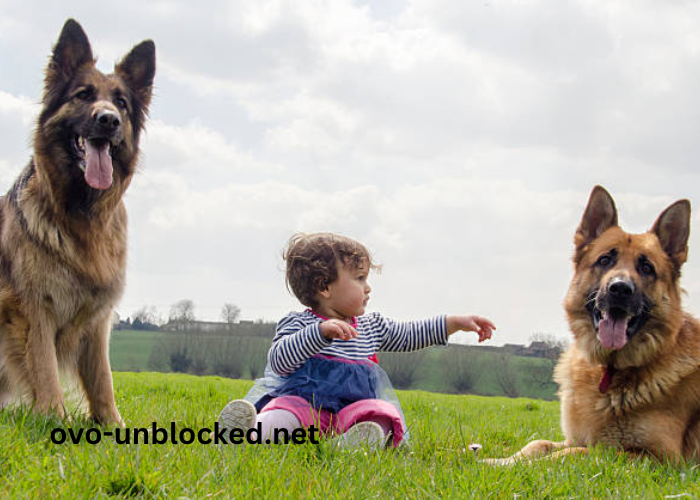Bringing a new puppy into your life is an exciting adventure, and when that puppy is aGerman Shepherd, the experience can be particularly rewarding. Known for their intelligence, loyalty, and versatility,German Shepherds have earned their reputation as one of the most popular dog breeds in the world. Whether you are looking for a companion, a working dog, or a family pet, understanding the specific needs and characteristics of aGerman Shepherd is crucial for ensuring a happy and healthy relationship.
In this blog post, we will explore various aspects of caring for aGerman Shepherd puppy, from training and socialization to health considerations and nutrition. Each section is designed to provide valuable insights and practical tips for both first-time and experienced dog owners, helping you to create the best environment for your new furry friend.
What Makes German Shepherds Unique?
German Shepherds are renowned for their exceptional intelligence and adaptability, which make them ideal candidates for various roles, including service dogs, search and rescue, and police work. Their strong work ethic, combined with their loyalty to their families, sets them apart from other breeds. Originating in Germany in the late 19th century, these dogs were initially bred for herding sheep and guarding livestock. This herding background contributes to their instinctual protective nature.
Another unique aspect ofGerman Shepherds is their physical characteristics. They typically have a robust, muscular build, with a distinctive appearance that includes a long, bushy tail and erect ears. Their coat can be various colors, including black and tan, sable, or all black. Beyond their striking looks,German Shepherds possess a high energy level and require regular exercise to maintain their physical and mental well-being.
When choosing aGerman Shepherd, it is essential to understand their unique temperament. They are known for being courageous and confident, but they can also be sensitive and require gentle handling, especially during training. Socialization and early exposure to various environments and people are vital for fostering a well-rounded and balanced personality in yourGerman Shepherd puppy.
How Can You Prepare Your Home for a German Shepherd Puppy?
Preparing your home for aGerman Shepherd puppy involves creating a safe and welcoming environment. Start by puppy-proofing your living space, removing any hazardous items that could pose a danger to your curious new companion. This includes securing electrical cords, removing toxic plants, and putting away any small objects that could be swallowed.
Designate a specific area in your home for yourGerman Shepherd puppy to sleep and rest. A comfortable dog bed or crate in a quiet location can help your puppy feel secure and establish a routine. Crate training can be beneficial for house training and providing a safe space for your puppy when you are not able to supervise them directly.
It is also essential to invest in the right supplies before bringing yourGerman Shepherd puppy home. This includes a high-quality puppy food that meets their nutritional needs, food and water bowls, chew toys, a leash and collar, and grooming supplies. Preparing these items in advance will make the transition smoother for both you and your new puppy.
Lastly, consider establishing a daily routine that includes feeding times, playtime, and training sessions. Puppies thrive on consistency and structure, which can help them adjust more easily to their new home.
What Should You Feed Your German Shepherd Puppy?
Nutrition plays a critical role in the growth and development of yourGerman Shepherd puppy. A well-balanced diet will provide the essential nutrients needed for their active lifestyle and healthy growth. It is important to choose a high-quality puppy food formulated specifically for large breeds, asGerman Shepherds are prone to certain health issues related to rapid growth, such as hip dysplasia.
Look for a puppy food that lists meat as the first ingredient and contains a balance of protein, fats, and carbohydrates. Essential fatty acids are crucial for healthy skin and coat, while vitamins and minerals support overall health. Be mindful of the feeding guidelines on the packaging, adjusting portions based on your puppy’s weight and activity level.
Puppies typically require three to four meals a day to sustain their energy levels. As yourGerman Shepherd matures, you can gradually transition to two meals a day. It is also essential to monitor your puppy’s weight, as obesity can lead to serious health problems in large breeds. Consult your veterinarian for personalized feeding recommendations based on your puppy’s individual needs.
Hydration is equally important; ensure that yourGerman Shepherd has access to fresh, clean water at all times. Avoid feeding your puppy human food, as many common foods can be toxic to dogs. Familiarizing yourself with safe and unsafe foods will help keep your puppy healthy.
How Can You Train Your German Shepherd Puppy Effectively?
Training yourGerman Shepherd puppy is a vital aspect of their development and well-being. Known for their intelligence,German Shepherds are highly trainable and often excel in obedience. Start training early, ideally when your puppy is between 8 and 16 weeks old, as this is a critical period for socialization and learning.
Use positive reinforcement techniques, such as treats, praise, and play, to encourage desired behaviors. Consistency is key; establish clear commands and ensure all family members use the same cues to avoid confusion. For example, if you choose “sit” as a command, ensure everyone uses that term when asking your puppy to sit.
Socialization is an essential component of training, exposing your puppy to various people, animals, and environments. This helps them develop confidence and reduces the likelihood of fear-based aggression as they grow. Enroll yourGerman Shepherd puppy in a puppy kindergarten class, where they can interact with other dogs and learn basic obedience skills in a controlled setting.
In addition to basic commands, consider teaching yourGerman Shepherd more advanced skills, such as leash walking and recall. These skills are crucial for ensuring your puppy is well-behaved and safe in different situations. Remember to be patient and understanding; training should be a fun bonding experience for both you and your puppy.
What Are the Common Health Issues in German Shepherds?
WhileGerman Shepherds are generally healthy dogs, they are prone to specific health issues due to their size and genetics. Being aware of these conditions can help you provide better care for your puppy and address potential problems early.
One of the most common health concerns inGerman Shepherds is hip dysplasia, a genetic condition where the hip joint does not fit properly into the hip socket. This can lead to arthritis and pain as the dog ages. Regular veterinary check-ups, maintaining a healthy weight, and providing appropriate exercise can help mitigate the risk of hip dysplasia.
Elbow dysplasia is another condition to watch for inGerman Shepherds, which affects the elbow joint and can cause lameness and pain. Like hip dysplasia, this condition is also genetic and may require surgical intervention in severe cases.
Bloat, or gastric torsion, is a serious and potentially life-threatening condition that can occur in deep-chested breeds like theGerman Shepherd. Symptoms include a distended abdomen, restlessness, and attempts to vomit. If you suspect your puppy may be experiencing bloat, seek emergency veterinary care immediately.
Other health issues that may affectGerman Shepherds include allergies, skin conditions, and degenerative myelopathy, a progressive disease that affects the spinal cord. Regular grooming, a balanced diet, and proactive veterinary care can help manage these concerns and keep yourGerman Shepherd healthy.
How Much Exercise Does a German Shepherd Puppy Need?
German Shepherd puppies are energetic and require ample exercise to maintain their physical and mental health. As a large breed, they need regular activity to support their growing bodies and prevent behavioral issues associated with boredom or excess energy.
During the early months, aim for short play sessions and walks, gradually increasing the duration and intensity as your puppy grows. Generally,German Shepherd puppies should have at least 30 to 60 minutes of exercise per day, divided into multiple sessions. Activities can include leash walks, playtime in the yard, or engaging in interactive games like fetch or tug-of-war.
As yourGerman Shepherd matures, you can incorporate more structured exercise, such as obedience training, agility courses, or obedience competitions. These activities not only provide physical exercise but also stimulate your puppy’s mind, helping to develop their problem-solving skills and intelligence.
Remember that puppies have growing bodies and should not engage in strenuous exercise, such as running long distances or jumping, until they reach maturity. Excessive exercise can lead to joint and bone problems, particularly in large breeds like theGerman Shepherd. Consult your veterinarian for personalized exercise recommendations based on your puppy’s age and physical condition.
How Can You Socialize Your German Shepherd Puppy?
Socialization is a critical aspect of raising a well-adjustedGerman Shepherd puppy. It involves exposing your puppy to various experiences, people, animals, and environments to help them develop confidence and adaptability. Early socialization can prevent fear-based behaviors and promote a calm demeanor in new situations.
Start socializing yourGerman Shepherd puppy as early as possible. The ideal time for socialization is between 8 and 16 weeks, as puppies are more receptive to new experiences during this period. Gradually introduce your puppy to different sights, sounds, and smells, allowing them to explore their surroundings in a positive and controlled manner.
Arrange playdates with other vaccinated puppies to help yourGerman Shepherd learn appropriate social skills. Puppy classes are also an excellent way to expose your dog to new environments while learning basic commands and meeting other dogs. Choose a reputable trainer who uses positive reinforcement methods.
Be patient and attentive during socialization sessions. Observe your puppy’s body language and be mindful of any signs of fear or discomfort. If your puppy appears anxious, remove them from the situation and try again later. The goal is to create positive associations with new experiences, so provide treats and praise when your puppy behaves confidently.
Continued socialization throughout yourGerman Shepherd‘s life is essential. Regularly expose them to new environments, people, and activities to ensure they remain comfortable and well-adjusted as adults.
Conclusion
Raising aGerman Shepherd puppy can be a fulfilling and enriching experience. By understanding their unique needs and characteristics, you can create a loving and supportive environment that promotes their health, well-being, and happiness. From preparing your home to implementing effective training and socialization strategies, every step you take contributes to a positive bond with your new furry friend.
Remember that patience and consistency are key when caring for yourGerman Shepherd puppy. With the right approach, you can raise a loyal, well-behaved companion who will bring joy to your life for years to come. Embrace the journey of puppyhood, and cherish the moments as you watch yourGerman Shepherd grow into a remarkable dog.

